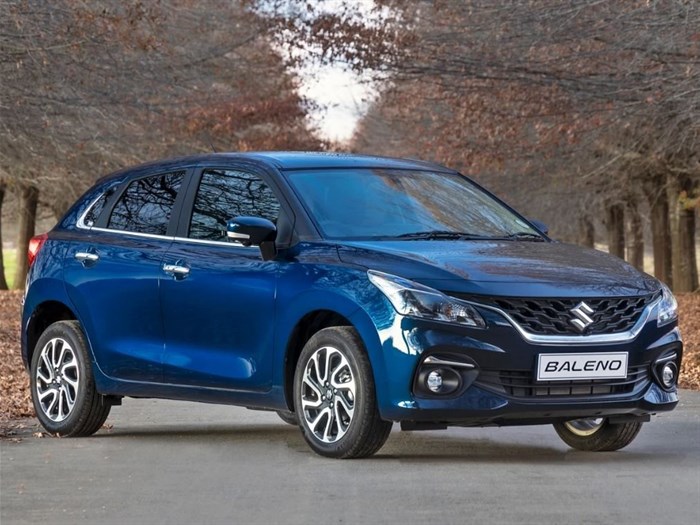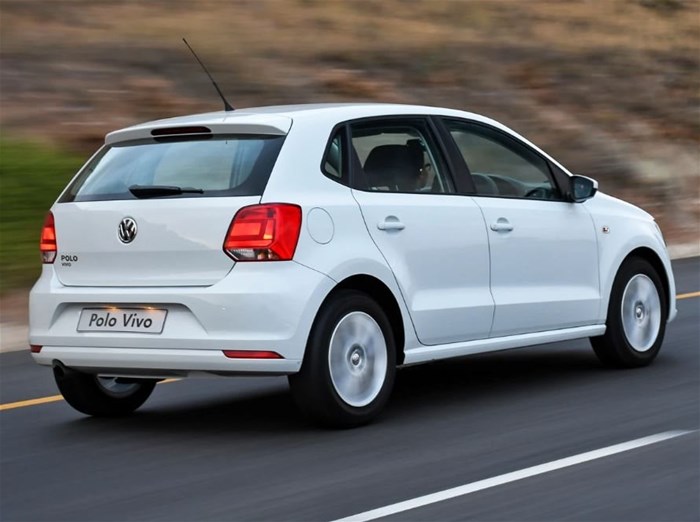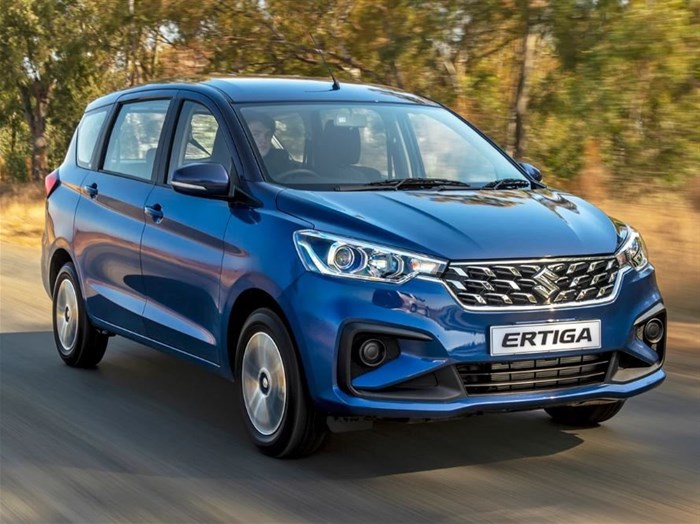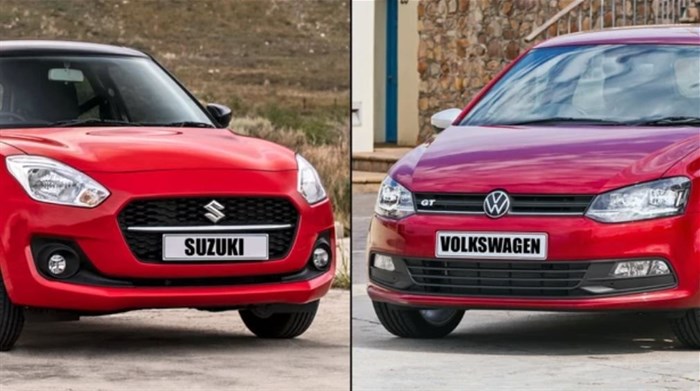Suzuki Auto SA has grown tremendously in recent times. But just how close is the Japanese brand to snatching second place from VW? Year-to-date dealer sales tell an interesting story.
It’s been a scarcely believable couple of years for Suzuki Auto South Africa. Once something of a bit-part player, the Japanese firm’s local division has rocketed up the sales charts in recent times, consistently breaking internal sales records and making third place on the monthly list of SA’s best-selling automakers very much its own.
While Toyota SA Motors is still way out in front, the gap between Suzuki and the second-placed Volkswagen Group (the latter, we should point out, includes the Audi brand) is narrowing – and fast. So, we decided to examine the year-to-date sales race with VW, though with a focus specifically on the dealer channel. The latter is, of course, considered to be a strong indicator of private-buyer sentiment.
Collectively, dealerships form the channel through which the vast majority of new-vehicle sales are registered. In May 2023, for instance, Naamsa estimated 38,872 units (or 90.2% of the total reported industry sales of 43,060 vehicles) represented sales in the dealer space. But before we delve into the year-to-date sales figures, let’s take a step back and consider how the Hamamatsu-based manufacturer has managed to climb this high, this quickly.
What’s driving Suzuki Auto SA’s recent sales success?

The Baleno is Suzuki Auto SA’s second-most popular vehicle in 2023.
Suzuki Auto SA opened its doors back in 2008 and has enjoyed 15 consecutive years of dealer growth since. In fact, the opening quarter of 2023 was the Suzuki dealer network’s best in history, while as many as nine dealerships (out of 97 dotted now round Southern Africa) each sold more than 100 new vehicles in March.
So, what’s behind this consistent growth? Well, in what has become an increasingly price-sensitive local market, Suzuki Auto SA has shrewdly taken advantage of its mother brand’s large-scale production facilities in fellow right-hand-drive country India, where its Maruti counterpart manufactures huge volumes of budget-friendly compact vehicles. For the record, Maruti Suzuki is an absolute giant in the world’s most populous nation, having achieved a staggering 42% market share in 2022.
As many as 12 of the 13 nameplates in Suzuki Auto SA’s stable today are imported from India, with only the Vitara (which is the brand’s slowest seller this year and looks likely to exit the local range soon) being sourced from Hungary in Europe. In addition, while the broader Swift line-up is manufactured in the South Asian country, the low-volume Swift Sport derivative is brought over from the Sagara factory in Japan.
VW Group vs Suzuki: a quick look back at 2022 sales
Suzuki Auto SA is thriving perhaps partly because of rather than despite South Africa’s challenging economic conditions since its attractively priced budget cars – virtually all of which play in the compact-vehicle space – are on offer at just the right time for many cash-strapped local consumers. Furthermore, the company has seemingly managed to secure a steady flow of stock, while other automakers continue to struggle with supply constraints.
Just how close was the Japanese firm to matching the Volkswagen Group last year? Well, the German firm’s total sales (again, including Audi) in South Africa fell 2.48% year on year to 69,801 units in 2022. The VW Group’s market share thus dropped from 15.41% to 13.20%, although it quite comfortably held onto second place on the overall list.
Meanwhile, Suzuki Auto SA improved its total sales a whopping 71.04% year on year to 47,178 units in 2022, rocketing up the rankings from sixth to third and boosting its market share from 5.94% to a very respectable 8.92%. Still, last year, Suzuki was a considerable 22,623 units behind the VW Group. In 2023, however, the race is far closer...
How is the VW brand faring in the dealer channel?

The Kariega-built Polo Vivo continues to function as the main volume driver for VW.
Year to date, the VW Group’s overall tally sits at 26,411 units, though that figure falls to 23, 912 when we remove Audi sales from the equation. But here we’re going to focus on the dealer channel, which means we won’t take into account sales to the rental industry or to the government, not to mention so-called “single” registrations (which comprise vehicles registered by manufacturers for their own use).
Over the opening five months of 2023, the Volkswagen brand sold 18,288 units through the dealer channel in South Africa, translating to a monthly average of 3,658 units. For the record, the year-to-date dealer-sales figure for the VW Group stood at 20,427 units over the same reporting period.
As you might have guessed, the Wolfsburg-based automaker’s locally produced hatchbacks – the Polo and Polo Vivo – were its key volume drivers. In May 2023, for instance, the Kariega-built siblings contributed 1,876 (1,378 of which went through dealers) and 1,024 (815 via dealers) registrations respectively and were supported by the imported T-Cross (550 total units) and Tiguan (208 total units), not to mention the new Ford-built Amarok (330 total units).
How is Suzuki performing in the dealer channel?

The Ertiga was Suzuki Auto SA’s third-best seller in May 2023.
In the opening months of 2023, Suzuki and the VW brand traded blows in the dealer channel, with the German firm having its way in January and March, and the Japanese manufacturer putting its nose ahead in February and April. The ding-dong battle continued in May when VW pushed ahead slightly.
Year to date, Suzuki’s overall total comes in at 19,729, with 17,402 of those units having been registered to private buyers through dealerships (that’s an average of 3,280 units a month). In terms of dealer sales, that puts Suzuki just 3,025 units behind the Volkswagen Group and a mere 886 units adrift of the VW brand.
Of course, the model that has done much of Suzuki’s heavy lifting in recent times is the Swift hatchback. With 17,282 units registered in 2022, the Swift was SA’s second best-selling passenger vehicle last year, finishing ahead of the Polo hatch (15,697 units), which found itself down in fifth, but behind the Polo Vivo (20,866 units). The Swift again dominated the sales charts in May 2023, with 1,178 units (1,156 of which were dealer sales) registered, while the Baleno (504 total units), Ertiga (425 total units), new Grand Vitara (382 total units) and S-Presso (352 total units) all also came to the party for the Hamamatsu-based automaker.
Will Suzuki overtake Volkswagen in South Africa?
So, will we see Suzuki leapfrog the VW brand (and perhaps even the Volkswagen Group) in South Africa? And, if so, how far away are we from such a situation? Well, considering the gap has narrowed markedly over the opening five months of 2023 – with the 113-year-old Japanese marque cutting VW’s lead in the dealer channel to fewer than 1 000 units – there’s no doubt we’re in for an intriguing remainder of the year.
The local market finds itself in increasingly turbulent times and we can’t help but feel the sustained economic challenges facing South Africa will largely favour Suzuki’s budget-friendly line-up (which currently runs from R166,900 to R529,900) over than the German manufacturer’s higher-priced portfolio (R248,500 to R1,663,400, or R3,871,100 if we include Audi).
When it comes to pure volume, VW continues to rely on its least-expensive model, the Polo Vivo (and, to a lesser extent these days, the Polo hatch). However, Volkswagen has plans to add a mystery third vehicle – some sort of sub-T-Cross crossover – to its Kariega production line, while it has also confirmed “there is hope” for a half-tonne bakkie spin-off. As much as these models have the potential to become significant volume drivers for VW, they are a few years away, with the new crossover likely to come online only in 2026 or 2027 (and the proposed bakkie thereafter).
Meanwhile, Suzuki recently added the new Grand Vitara to its local line-up, positioning the revived nameplate as its flagship model. Perhaps more pertinent to the brand’s volume aspirations, however, is the fact the Vitara Brezza – one of its strongest sellers last year – has been discontinued locally. Still, the upcoming Fronx (a Baleno-based crossover) may well fill much of this gap, while the new 5-door version of the already popular Jimny will surely also attract a number of fresh sales.
In the short term, Suzuki Auto SA’s star looks all but certain to continue to rise as the fast-growing automaker goes about hunting down VW through the dealer channel. We’re absolutely itching to see what the sales figures say by the end of the year…
This article was originally published on Cars.co.za...









































